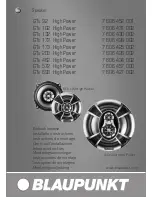
When watching movies in a home theater system,
however, many listeners prefer a punchier sound, equal-
ized to enhance effects like explosions and gunfire. For
this effect, flip the switch to VIDEO.
Note: If your main speakers are large, offering generous
bass response, and you are connecting them full-range,
you will most likely be using the SW10 only for very low
bass reinforcement (usually below about 40Hz). In this
case, the Video mode will not yield an increase in bass
output at these frequencies, but will actually decrease its
output, so the AUDIO mode may work better.
LOW PASS FILTER:
This control determines the upper-
limit frequency the subwoofer will reproduce. For
example, setting the filter at 100Hz will cause the
subwoofer to reproduce only frequencies below 100Hz.
The Low Pass Filter is continuously variable between
40Hz (low bass) and 180Hz (upper bass), to
accommodate different speakers.
Two tips on using the Low Pass Filter:
• If you are using either the Low-Level Filtered or High-
Level Filtered connection methods, your main speakers
are only operating above 100Hz (the High Level is fixed
at that frequency), so a good starting point would be
setting the Low Pass Filter at about 100Hz.
• If using either Low-Level Full-Range or High-Level Full-
Range methods, your main speakers are reproducing
the entire frequency range, so you'll want to initially set
the low-pass filter at the frequency where the main
speakers roll off. For example, if your main speakers' low
frequency limit is at 60Hz, start by setting the Low-Pass
Filter set at 60Hz.
See the Fine-Tuning section for further adjustment
guidelines.
SUBWOOFER PHASE:
This switch sets the phase of
the subwoofer at either the 0° position (normal phase) or
the 180° position (reverse phase) to achieve the
smoothest possible bass response in your system.
This phase-reversing option is important because if bass
frequencies come from both the subwoofer and the main
speakers, peaks and dips in the frequency response can
occur at the listening position. In these cases, reversing
the subwoofer phase can improve blending and balance.
To properly set the Subwoofer Phase:
• Play familiar music, reversing phase settings. And listen
from your usual position.
• Avoid evaluating while standing above the subwoofer or
amplifier; sound at the listening position will be
significantly different.
• The correct setting is the one in which the bass is the
loudest at the listening position.
STANDBY MODE:
This feature automatically switches
your SW10 into minimum-power mode (ie, sleep) when-
ever no signal is present for 20 minutes. When a signal
is received, it immediately turns on again. As Standby
Mode is automatic, it requires no adjustment, nor is there
a need to turn the SW10 on and off every time it is used.






























